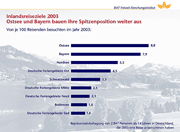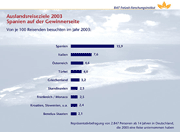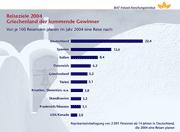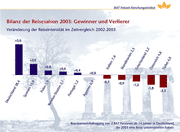20th German Tourism Analysis
Review of the 2003 travel season
2003 was the third year of crisis in which the travel industry moved between losses and slumps after 11 September 2001, the war in Iraq and the continuing economic downturn. There has never been such a downturn in the success story of post-war tourism. The travel intensity of German citizens who travelled at least five days on holiday reached a new low in the past travel season: 52 percent - a further decline of 2 percentage points compared to the previous year (54%). More and more holidaymakers are switching to shorter trips of 5 to 13 days (2001: 20% - 2002: 26% - 2003: 28%), while the traditional annual holiday of at least two weeks is steadily losing ground for cost reasons. The economic development is reinforcing the German trend towards shorter holidays. This is the result of the 20th Tourism Analysis by the Leisure Research Institute of British American Tobacco, in which 5,000 German citizens aged 14 and over were asked about their holiday behaviour in 2003 and their travel intentions for 2004.
Change in holiday behaviour
The desire to travel is there, but holidays are getting shorter and shorter
„Many German citizens are still sitting on packed suitcases, but at the same time have to tighten their belts,“ says Prof Dr Horst W. Opaschowski, Director of the Institute. „This is because the trend towards shorter trips continues to grow and is causing problems for the holiday hotel industry in particular.“ A fundamental change in the holiday behaviour of Germans is becoming apparent: holidays are becoming shorter and shorter. The length of stay at holiday destinations is falling continuously (1980: 18.2 days - 1990: 16.3 days - 2000: 14.8 days - 2003: 13.4 days) Fewer and fewer Germans can afford a two-week holiday (1993: 78% - 2000: 74% - 2002: 67% - 2003: 63%). A noticeable double-digit decline in the duration of holidays within a decade. The reasons for this are not so much a tendency towards psychological saturation as economic limits.
The desire to travel is there, but holiday money is scarce. This is particularly true for pensioners, whose share of two-week holidaymakers is the lowest (2003: 56%). „The turnaround in prosperity has also reached tourism,“ says Professor Opaschowski. „Germans have mastered the art of living: they are saving their holidays by shortening the duration of their trips. More than one in three holidaymakers are turning the best weeks of the year into the best days of the year.“ This is fundamentally changing the style of travel: more and more travel wishes have to be realised in less time. Instead of „new modesty“, it's more a case of raising expectations. Holidaymakers are just as demanding as they used to be on increasingly tight time and money budgets. They expect the same quality even from cheap offers. The demand is for quality holidays at reasonable prices.
„This development has two faces for the tourism industry,“ says Professor Opaschowski: „On the one hand, the positive holiday philosophy remains stable, on the other hand, sales are falling.“ However, the industry is encouraged by the economic evidence that tourism is growing faster than the economy as a whole. Tourism acts as a kind of lead economy with a trend-setting character.
A divided world while travelling
Childless people spend the most money
Germans spend an average of around 1,030 euros per person on holiday. This not only includes travel and accommodation costs. It also includes all additional expenses such as eating out, shopping, excursions and tips. However, this average figure says little about the major economic inequalities in the travel market.
Families with children have to make do with an average of €951 and pensioners with €953 per person. Singles spend 1,015 euros and childless couples can afford 1,177 euros per person. The so-called „young seniors“ aged 50 to 64 spend the most money on holiday (€1,204) because they generally have no family or children to look after. The differences in holiday budgets between East Germans (877 euros) and West Germans (1,069 euros) are also large. And there is a world of difference between the amount spent on holidays in Germany (743 euros), on trips to other European countries (1,116 euros) and on long-distance trips (1,921 euros).
Opaschowski: „Price is becoming increasingly important when choosing a holiday destination. Domestic holidays benefit from this, especially as they only last 10.9 days on average, whereas trips to the USA, for example, last 23.6 days. Being economical with your holiday budget means being economical with money and time.“
Domestic destinations 2003
Baltic Sea and Bavaria further extend their leading position
The beautiful summer brought growth to some domestic destinations that has not been seen for years. The big winner last season was Germany - and the trend is rising. Germans have been rediscovering their homeland since the turn of the millennium. The success figures speak for themselves: 2000: 31% - 2001: 34% - 2002: 33% - 2003: 38%. The last time there was such a high proportion of domestic trips was in 1998. Professor Opaschowski: „Financial and psychological factors are equally important for the rediscovery of local destinations. Quality and price must be right. And cleanliness and safety must also be guaranteed - in addition to beautiful scenery.“
In conjunction with the good weather, the holiday regions on the Baltic Sea in particular benefited from the change in travel flows and moods last year (8.8% - previous year 2002: 7.6%), while the North Sea coast and islands were able to maintain their previous year's level (2002 and 2003: 5.3% each). Bavaria was also one of the winners last season (7.9% - previous year: 6.5%). The crisis in mountain and Alpine tourism has been overcome. The Black Forest (+0.9 percentage points) and Lake Constance (+0.3) were also able to consolidate their appeal to holidaymakers. Germans have made a virtue out of necessity: holiday destinations close to the earth, i.e. those that can be reached without a flight, continue to gain in popularity among holidaymakers.
Destinations abroad in 2003
Spain on the winning side, Turkey on the losing side
Low-cost airlines are revitalising air tourism and making Spain's tourism crisis a thing of the past. Since 1999, Spain, „the“ foreign holiday destination for Germans, had suffered permanent losses (1999: 17% - 2000: 16% - 2001: 15% - 2002: 14%). This was equivalent to a double-digit drop in the proportion of German visitors. Since 2003, however, there have been signs of a trend reversal in tourism: Spain once again emerged as the undisputed winner in the last travel season (15.9%). Portugal also recorded modest growth (2002: 0.8% - 2003: 1.2%).
By contrast, all other holiday destinations suffered under the competitive pressure from Germany. Turkey in particular felt the effects of the change in direction of German holiday flows from abroad to Germany. The upward trend of recent years was slowed noticeably (2003: 4.0%). In the previous year 2002, the figure was still 6.3 per cent. For the time being, the ranking and order of Germany's favourite travel destinations that has existed for over thirty years remains unchanged. The front-runner Spain (15.9%) is joined by Italy (7.6%) and Austria (4.6%). They are followed by Turkey (4.0%), Greece (3.2%), France (2.5%), Scandinavia (2.5%) and holiday destinations in the former Yugoslavia such as Croatia and Slovenia (2.4%).
The long-haul holiday market continues to stagnate at a low level. Last year, more Germans spent their holidays at the Baltic Sea (8.8%) than in all non-European countries combined. The USA/Canada (1.4%), Tunisia/Morocco (1.0%), Egypt (0.9%) and the Caribbean, including Cuba and the Dominican Republic (0.8%), suffered losses compared to the previous year. Opaschowski: „Long-distance travel remains attractive as a holiday dream, but in economically and politically difficult times it tends to be the exception to the rule.“ In the long term, they will not compete with Mediterranean and domestic holiday destinations. At best, low-cost airlines could give long-haul tourism a boost again.
Tourism forecast 2004
Silver lining on the horizon
At first glance, the forecasts for the 2004 travel year are gloomy. The proportion of Germans who are certain to go on holiday again this year is lower than it has been for over ten years. The last time there was a similarly low figure was in the year after reunification (1991: 41%). Since then, there has been a decline: in 2002 and 2003 it was 47 per cent and this year it is just under 42 per cent of Germans who definitely want to go on holiday.
The only source of confidence is the fact that the number of people refusing to travel is no longer rising: 1999: 23% - 2001: 24% - 2003: 26% - 2004: 25%. The industry's hopes are therefore pinned on the undecided, whose share has risen from 26 to 33 per cent in the past twelve months. Professor Opaschowski: „If the economy picks up now and tour operators offer good value for money, then there may be light at the end of the tunnel again.
Destinations 2004
Greece the coming winner
And where are you planning to go in 2004? The representative survey conducted by the B.A.T Freizeit-Forschungsinstitut on the destinations planned for 2004 shows that More than one in five Germans with definite travel plans want to stay in their own country (22.4%). All the others are travelling abroad. Spain (12.6%) remains the front-runner among foreign holiday destinations, followed by Italy (8.4%) and Austria (6.2%). Greece may displace Turkey for the first time in the coming season. The Olympics attract additional guests. 3.2 per cent of German travellers visited Greece last year. In 2004, 5.2 per cent want to spend their holidays there. Greece could be the winner of the coming travel season - ahead of the Turkish Riviera (5.1%) for the first time. Croatia and Slovenia (3.8%) and Scandinavia (3.2%) remain attractive destinations. In terms of non-European destinations, only the USA (2%) and Egypt (1.5%) are in demand. Otherwise, long-haul destinations remain more dream destinations - and that means: more wishful thinking than reality.
Technical data of the TA 2004 survey: Results of the 20th German Tourism Analysis
Number and representation of respondents: Germany, 5,000 people aged 14 and over
Survey period: 6 to 26 January 2004
Survey institute: IPSOS Deutschland GmbH (formerly INRA Germany), Mölln
See also directory of all publications






